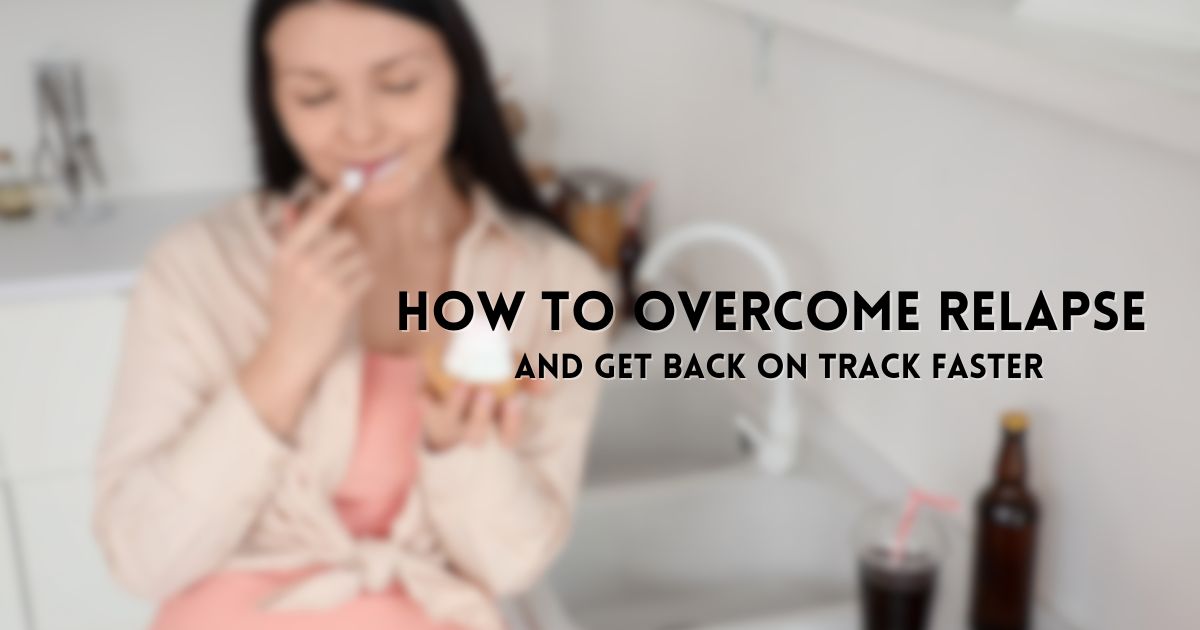Relapse Isn’t the Problem—Staying Stuck Is
You start strong. You’re motivated, determined. You’ve made a plan, stocked your fridge, set your alarm for that early workout. This time, it’s going to be different.
And then—life happens. You miss a workout. You grab fast food because you’re exhausted. You tell yourself you’ll get back on track tomorrow, but tomorrow turns into next week, and before you know it, you’re right back where you started.
Sound familiar?
This is what no one tells you: relapse is part of the process. It’s not a sign you’ve failed. It’s not proof you can’t do this. It’s something every single person goes through when changing their habits.
The difference between the people who succeed and the ones who stay stuck? How quickly they get back into action.
Why Most Habit Change Fails
There’s a big lie about habit change: that once you start, you should be able to keep going perfectly.
That’s not how change works.
There’s a model in psychology called the Transtheoretical Model (TTM), also known as the Stages of Change. It lays out exactly how people move from wanting to change to actually sticking with it. And guess what? Relapse is one of the stages. It’s not a fluke. It’s something to expect.
The real problem isn’t that you mess up. It’s what happens next.
Do you use that slip-up as a reason to stop? Do you tell yourself you’ve ruined everything, so you might as well give up? Or do you have a plan for exactly what to do when you fall off track?
Why I Teach My Clients How to Fail
After nearly 20 years as a health and life coach, I’ve seen this pattern play out over and over again. Women sign up for six-week or twelve-week programs. They white-knuckle their way through, following every rule, trying to be perfect.
But no one can white-knuckle their way through a lifetime.
At some point, you will miss a workout, eat off-plan, or lose motivation. That’s when most people quit. That’s when the “I’ll start over Monday” cycle kicks in.
This is why I work with my clients long-term. Because learning how to manage mistakes is the difference between a temporary diet and real, lasting change.
When you don’t manage mistakes, they pile up. A bad meal turns into a bad weekend. A skipped workout turns into a skipped month. And then you feel even worse, like you’ve failed again.
So let’s talk about relapse. What it is, why it happens, and how to stop it from derailing you for good.
The Stages of Change: Why Relapse Is Part of the Process
Most people think habit change is a straight line. You decide to start, you take action, and you reach your goal.
But that’s not how it works.
Real change happens in stages. And one of those stages is relapse. It’s not a mistake. It’s part of the process.
The Stages of Change breaks down how we move from wanting to change to actually doing it. Understanding these stages can help you stop feeling guilty for struggling and start focusing on what to do next.
The Six Stages of Change
- Pre-contemplation: You’re not even thinking about change. Maybe you don’t see a problem yet. Maybe you’ve convinced yourself you don’t have time or that nothing works for you.
- Contemplation: You start considering change. You know something needs to shift, but you’re unsure how or if you’re ready.
- Preparation: You’re planning. You’re researching workouts, looking up healthy recipes, or buying new sneakers. This is where most people feel like they’re taking action—but thinking about change is not the same as doing it.
- Action: You start. You go to the gym. You prep your meals. You stick to a bedtime. This is where most people assume they’ll stay forever.
- Maintenance: Your habits feel more automatic. You’re seeing progress. But this is not the finish line.
- Relapse: Life happens. You skip workouts. You eat off-plan. You stop prioritizing yourself.
This is where most people give up.
Why Relapse Is Inevitable—And Why That’s a Good Thing
We expect smooth progress. But you wouldn’t expect to drive to a new place without hitting a red light, right?
Relapse is that red light. It doesn’t mean you’re lost. It just means you need to adjust and keep going.
The key is not avoiding relapse—it’s knowing what to do when it happens. That’s where most people go wrong. They get stuck in the shame spiral, instead of recognizing relapse as an opportunity to learn and adjust.
So, instead of asking, “How do I stop failing?” start asking, “What’s my plan for when I do?” That’s how you make relapse a bump in the road, not the end of the journey.
Why Frustration Feels So Hard—And What It Really Means
Frustration is one of the biggest reasons people quit on their goals.
You start something new, thinking you’ve got it all figured out. Then reality hits. The workouts feel harder than expected. You don’t see results fast enough. You keep making mistakes even though you “know better.”
And suddenly, that voice creeps in:
Why is this so hard?
Why can’t I just do it?
Maybe I’m not meant to succeed at this.
This is where most people give up—not because they can’t succeed, but because they don’t know how to handle frustration.
Frustration Is a Learning Signal, Not a Stop Sign
Frustration happens in the gap between what you know and what you haven’t mastered yet.
You know what to do. You know why it’s important. But you haven’t built the consistency or skills to do it easily yet. That gap is uncomfortable. Your brain wants to escape it.
But what if frustration wasn’t a sign of failure?
What if frustration was proof that you’re learning?
Think about strength training. If your muscles aren’t tired, they’re not growing. The discomfort is what creates change. The same thing happens with habit change—when things feel hard, it’s not because you’re doing it wrong. It’s because you’re building something new.
How to Stop Letting Frustration Win
Instead of making frustration mean you’ve failed, try this:
- Notice it. I feel frustrated because I’m learning something new.
- Name the gap. What do I not know yet?
- Keep going. The more I practice, the easier this will get.
Relapse isn’t just about behavior—it’s about mindset. If you expect frustration and see it as part of the process, it won’t knock you off track. It will become a sign that you’re on the right path.
Why You Keep Going Off Plan—Even When It Makes No Sense
You tell yourself you’re going to eat better. You make a plan. You stock your kitchen with healthy food.
Then, out of nowhere, you’re elbow-deep in a bag of chips, or skipping the workout you swore you’d do.
And afterward? Confusion. Guilt.
“Why did I do that? I know better.”
This is where most people get stuck. They think willpower failed them. But willpower wasn’t the problem.
The real reason you went off plan? Your emotions drove the behavior.
The Think-Feel-Act Cycle: How Your Brain Keeps You Stuck
This is a Cognitive Behavioral Therapy (CBT) concept I teach all my clients. It explains why we do things that don’t make sense.
- A Thought Happens → “This is too hard.”
- That Thought Creates a Feeling → Frustration, loneliness, stress.
- That Feeling Drives an Action → Skip the gym. Overeat. Scroll for hours.
The action isn’t random. It’s an attempt to feel better.
How Emotions Drive Your Habits
Most of us assume we mess up because we’re lazy, weak, or undisciplined. That’s not true.
We go off plan because of how we feel in the moment.
- Lonely? You might reach for comfort food.
- Overwhelmed? Skipping the workout feels easier.
- Stressed? A glass of wine will make you feel better.
And because we don’t recognize that our emotions are running the show, we don’t know how to stop it.
How to Break the Cycle
Instead of asking, “Why do I keep failing?” start asking, “What was I feeling before I went off plan?”
When you learn to identify the emotion driving the behavior, you can interrupt the cycle before it happens.
This is how habit change actually works—not by forcing yourself to be perfect, but by understanding why you struggle in the first place.
The Faster You Get Back to Action, the Faster You Succeed
The difference between people who reach their goals and those who don’t?
How fast they get back into action.
Not how perfectly they follow a plan. Not how much motivation they have. Not even how much weight they lose in the first few months.
It’s how quickly they recover from setbacks.
A Single Treat Won’t Derail You—Staying Stuck Will
There’s a stat that says 97% of people who lose weight will regain it within five years.
I believe this has a lot to do with it.
Because the people who stay stuck in the “I messed up, so I might as well quit” cycle? They keep repeating the same pattern over and over.
The Ice Cream Test: How Do You Respond to Mistakes?
Ask yourself this:
What’s the difference between…
- The version of you who has ice cream with her grandkids, enjoys it, and gets right back to normal eating the next day?
- The version of you who has ice cream, feels guilty, and spirals for a week—eating more junk, skipping workouts, and feeling like a failure?
It’s not the ice cream that makes the difference. It’s how you think about it.
One version of you understands that a single choice isn’t a big deal. The other version believes she’s “ruined everything” and struggles to get back on track.
If you’re constantly in the second mindset, it’s worth asking: What’s really going on?
What Would You Say to Someone You Love?
If your best friend or your kid came to you and said, “I ate off-plan, I’m a failure,” what would you say?
You wouldn’t tell them to give up. You wouldn’t tell them they should start over next Monday. You’d tell them to take a deep breath and just get back to what they were doing.
So why wouldn’t you do the same for yourself?
Mistakes Don’t Mean You’ve Failed—They Mean You’re Learning
Every single person who’s ever changed their habits has slipped up. The ones who succeed aren’t the ones who never relapse. They’re the ones who get back into action faster.
If you take nothing else from this, remember: Relapse isn’t the end. It’s just a step in the process.
So ask yourself:
- What’s one relapse pattern you’ve noticed?
- How can you plan ahead for it next time?
And if you’re stuck in the “I know what to do, I’m just not doing it” cycle, let’s talk. Book a strategy call here and let’s get you back on track.
Ready to take the first step? Let’s talk.

Ready to Take the First Step?
You know what you should do, but something’s holding you back—and that’s okay. Let’s figure it out together. Book a free “I Know What to Do, I’m Just Not Doing It” Strategy Call with me today. We’ll dig into your unique challenges and create a clear path forward so you can finally feel in control of your health and life.

Elizabeth is a Master Certified Life and Health Coach with over 18 years of experience, dedicated to helping women in midlife thrive through holistic health and wellness. Her personal journey began with a desire to reduce her own breast cancer risk, which evolved into a mission to guide women through the complexities of midlife health, from hormonal changes to mental clarity and emotional resilience.
Elizabeth holds certifications from prestigious institutions such as The Life Coach School, Precision Nutrition, and the American Council on Exercise, as well as specialized training in Feminist Coaching and Women’s Hormonal Health. Her approach is deeply empathetic, blending her extensive knowledge with real-life experience to empower women in their 50s and 60s to build sustainable health habits that last a lifetime.
Recognized as a top voice in women’s health, Elizabeth speaks regularly on stages, podcasts, and webinars, inspiring women to embrace midlife with energy, confidence, and joy. Her passion is helping women regain control of their health, so they can fully engage in the things that matter most to them—whether that’s pursuing new passions, maintaining strong relationships, or simply feeling great in their own skin.

